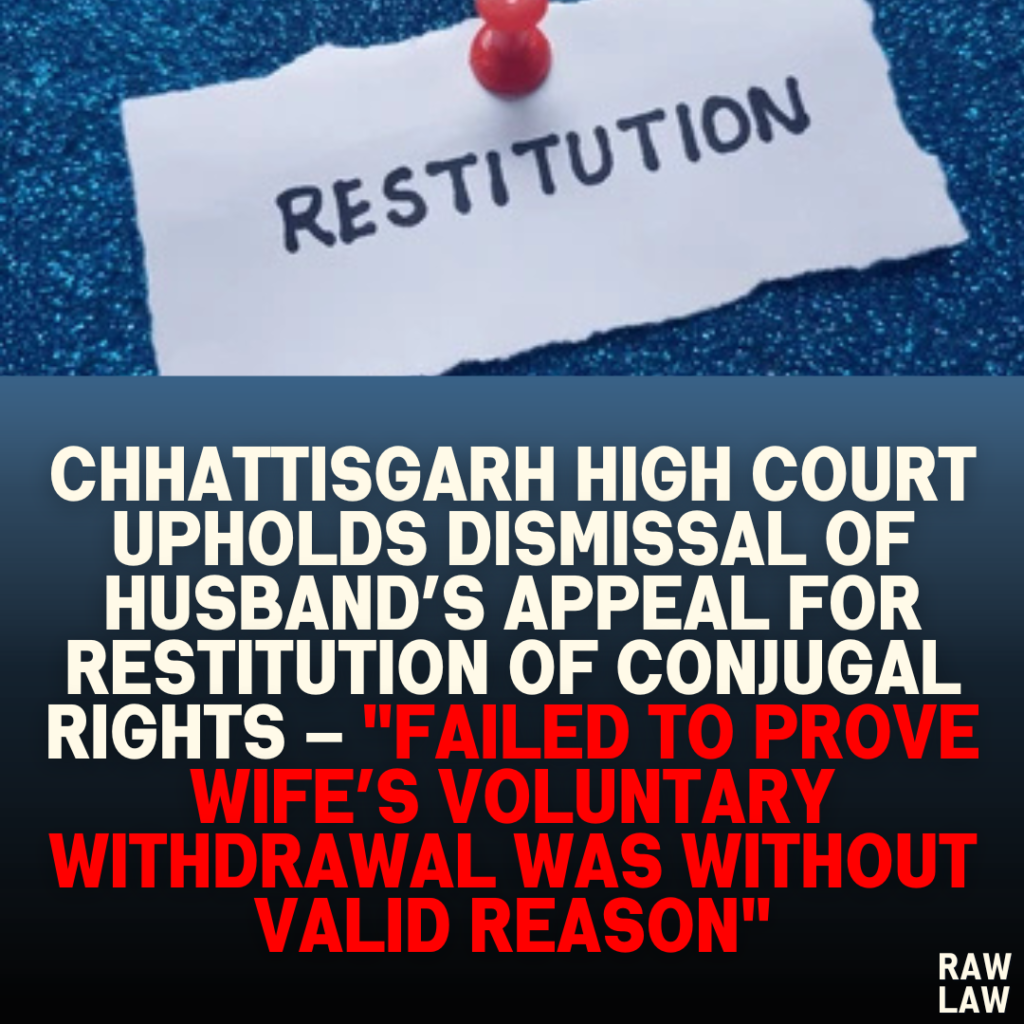Court’s Decision:
The Chhattisgarh High Court dismissed the appeal against the Family Court’s judgment, which had denied the husband’s application for restitution of conjugal rights under Section 9 of the Hindu Marriage Act. The court found no sufficient grounds to overturn the Family Court’s findings, as the appellant failed to prove that the wife had voluntarily deserted him without reasonable excuse.
Facts:
The marriage between the appellant and the respondent was solemnized in 1983, and two children were born from the marriage, one of whom has passed away. The appellant, employed as a messenger at a State Bank branch, was transferred to Saraipali in 2007, while the respondent continued living at Mahasamund with their surviving child. The respondent stopped cohabiting with the appellant after his transfer, leading him to file an application under Section 9 of the Hindu Marriage Act, which was dismissed by the Family Court.
Issues:
The main issue before the court was whether the respondent had withdrawn from the society of the appellant without reasonable excuse, thus entitling the appellant to a decree for restitution of conjugal rights.
Petitioner’s Arguments:
The appellant contended that the Family Court’s judgment was erroneous as it failed to appreciate his attempts to bring the respondent back to cohabitation. He argued that despite his efforts, the respondent continued living separately without justifiable cause, and hence, the court should have granted his request for restitution of conjugal rights.
Respondent’s Arguments:
The respondent argued that the Family Court had rightly dismissed the application, as she was staying with her handicapped son in Mahasamund and the appellant had not visited her regularly after his transfer to Saraipali. She contended that she had not withdrawn from the society of her husband without sufficient reason, as her primary obligation was to care for their son.
Analysis of the Law:
The court applied Section 9 of the Hindu Marriage Act, which provides for restitution of conjugal rights when one party has withdrawn from the society of the other without reasonable excuse. The burden of proof rests on the party claiming withdrawal without reasonable excuse.
Precedent Analysis:
The court did not cite any specific precedents in its decision but relied on a detailed analysis of the oral and documentary evidence presented during the proceedings.
Court’s Reasoning:
The court noted that the appellant failed to establish that the respondent’s refusal to live with him was voluntary and without a valid reason. It observed that the respondent was living with their handicapped son and had legitimate grounds for remaining in Mahasamund. Furthermore, the appellant admitted during cross-examination that he had stopped visiting Mahasamund for the last three years. Based on these findings, the court concluded that the appellant had not met the burden of proof required under Section 9 of the Hindu Marriage Act.
Conclusion:
The court upheld the Family Court’s dismissal of the application for restitution of conjugal rights, finding that the appellant failed to prove that the respondent wife had withdrawn from the marriage without sufficient cause. The appeal was dismissed.
Implications:
This decision reinforces the legal principle that in restitution of conjugal rights cases, the burden lies on the petitioner to prove that the respondent has withdrawn from the marital relationship without reasonable excuse. The court also emphasized that familial obligations, such as caring for a handicapped child, can be considered valid reasons for living separately.




Pingback: Delhi High Court Rules Orders Under Section 12 of Guardians and Wards Act Appealable Under Section 19 of Family Courts Act, Citing Lasting Impact on Child’s Well-Being - Raw Law
Pingback: Delhi High Court Denies Interim Bail, Modifies Custody Parole with Strict Restrictions for Accused Involved in Radicalization and Conspiracy to Attend Daughter's Wedding - Raw Law